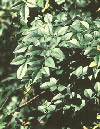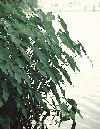Home >>> Landscaping >> Invasive Non-native Species
Invasive Non-native Plant Species
What is an invasive non-native plant?
An invasive non-native plant species is an inroduced species that has been shown to displace the native vegetation by out-competing native species. Without the factors that normally keep them under control in their native homes, invasive vegetation species overwhelm and displace existing vegetation to form dense, single-species stands that dominate and displace the natural community.
A list of the invasive status of non-native plant species in Florida can be found at the The IFAS Assessment of the Status of Non-Native Plants in Florida’s Natural Areas (IFAS Assessment) website. Use the Conclusions Page to find non-native plants listed by common name or genus.
Prevent the spread of invasive non-native plants
By choosing to plant a garden with native plants, you will prevent the spread of invasive plants from your yard to other natural areas. At the same time, you conserve water, energy, time and money, as well as reduce or eliminate the need for harmful pesticides and herbicides. There are a wide variety of native plants and landscaping designs to choose from in creating the Florida yard that is the most pleasing to you.
Invasive species to avoid or eliminate in your yard & neighborhood: |
|||
 |
Ardesia Ardesia crenata |
|
Air potato Dioscorea bulbifera |
 |
Chinese tallow Sapium sebiferum |
 |
White-flowered wandering Jew Tradescantia flumenensis |
|
|
Nandina Nandina domestica |
|
Wild taro Colocasia esculenta |
|
|
||
For more information about invasive plants in Florida, visit the Florida Exotic Plant Council.
Why should you care?*
Once invasive plants take over our native plants, the result is:
- Florida’s natural biodiversity is destroyed.
- Our native plants can eventually become permanently eliminated.
- The animals that use those native plants cannot make use of the non-native ones.
- Aquatic invasive plants can harm fish habitats.
-
Boating, swimming, hiking and other uses can be eliminated from areas with invasive plants because they clog up areas.
- Costs billions of dollars to eradicate.
*This list has been adapted from http://plants.ifas.ufl.edu/node/673 .




